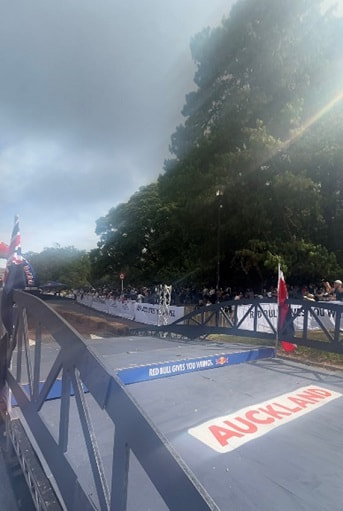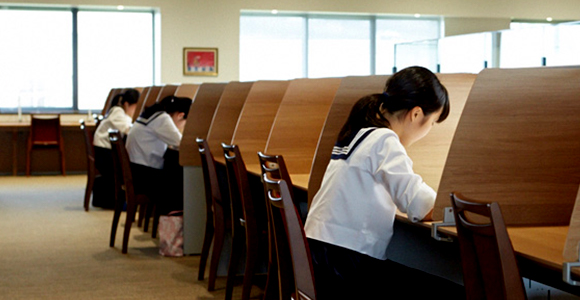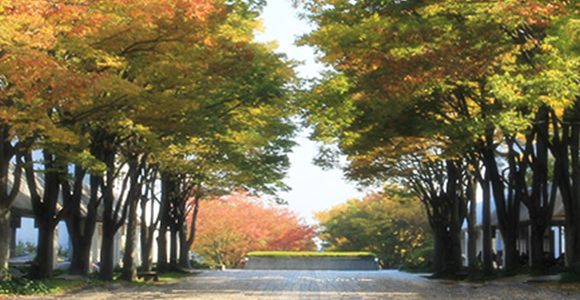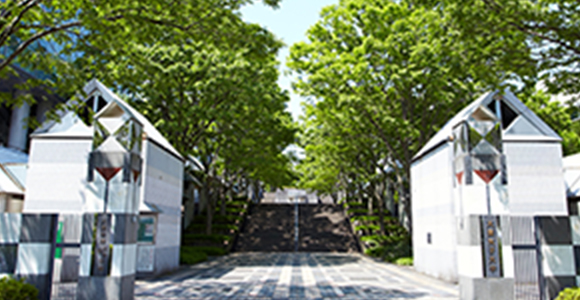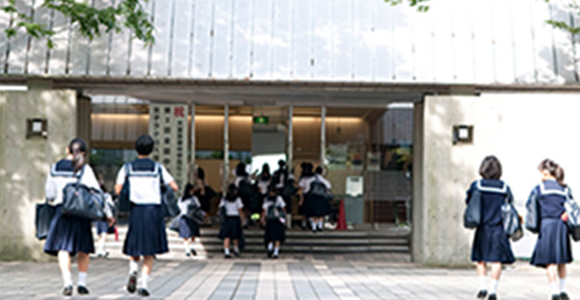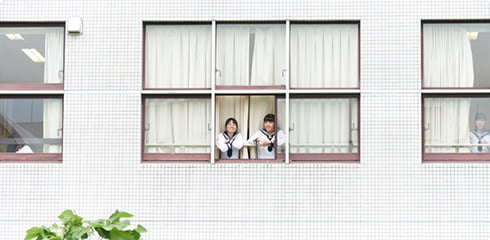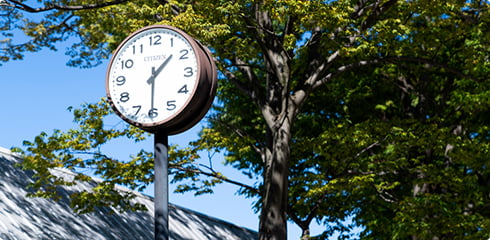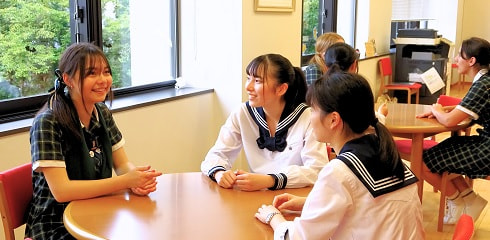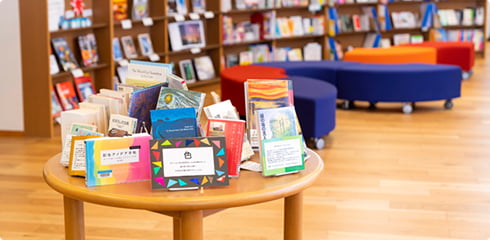【英語・国際】ターム留学中間報告「ニュージーランドコース」(高1 Uさん)
更新日時:2025年3月18日

【英語・国際】ターム留学中間報告「ニュージーランドコース」(高1 Uさん)
ごきげんよう。ニュージーランドでの生活が始まってから、早くも1ヶ月ほどが経ちました。私はニュージーランドの最大の都市であるオークランドで生活しています。 初めはバスの使い方や教室の場所など何もかも分からなかった生活に少しずつ慣れて来ました。 Good day to you. It has already been a month since I started living in New Zealand. I’m living in Auckland, the biggest city in New Zealand. At first, everything was new for me, like how to use the bus and where the classrooms were, but now I have gotten used to it.
〔学校生活について: About school life〕
私はオークランド郊外のノースショアという地域にあるWest Lake Girls High Schoolに通っています。約2,000人が通うこの学校には、一定数の留学生がおり、日本だけでなく、中国やドイツからの留学生もいます。
初日の学校では、現地の子どもたちの話すスピードについていけなかったため、中国から来た留学生とよく話していました。しかし、帰りにバスを待っている間、勇気を出して現地の子に話しかけることができました。話しかけると、とても優しく接してくれて、私の拙い英語も快く聞いてくれたので、恐れずに話しかけることができるようになりました。
I go to Westlake Girls High School, which is located in the North Shore area of Auckland's suburbs. My school has about 2,000 students, including several international students from Japan, China, and Germany.
On my first day of school, I couldn’t keep up with how fast the local students spoke, so I often talked with one internal student, who is from China. However, while waiting for the bus after school, I gathered the courage to talk to a local student. When I spoke to her, she was very kind and welcoming, and she listened patiently to my broken English. Thanks to this, I gained confidence and started talking to local students without fear.
私の学校では、学年ごとに選べる科目数が異なります。Year 11(日本でいう高校1年生)では、英語、数学、理科が必須で、さらに3教科を選択できます。留学生は英語の授業が必須なので、私は歴史とダンスの授業を選択しました。理科の授業は少し難しく、日本で既に学習した内容を学んでいるものの、専門用語が多く、翻訳をしないと理解できないことが多いので、他の科目よりも理解するのに時間がかかります。
しかし、ある日問題集を解いていて分からなくて困っていた時、友達が「何か困ってる? 助けるよ。」と声をかけてくれ、紙に書いて一から説明してくれました。そのおかげで理解することができました。このように、困った時にはみんなが助けてくれるので、とても心強いです。
At my school, the number of elective subjects varies by grade. In Year 11(equivalent to the first year of high school in Japan), English, Math, and Science are compulsory, and we can choose three additional subjects. Since international students must take English classes, I chose History and Dance.
Science classes are a bit difficult for me. Even though I have already studied some of the content in Japan, there are many technical terms that I don’t understand without translating them. This makes it more challenging compared to my other subjects. However, one day, when I was struggling with a workbook, one friend asked me, "Are you okay? Do you need help?" She kindly wrote everything down and explained it to me step by step. Thanks to her, I was able to understand the topic. I feel very reassured knowing that my classmates will help me whenever I need it.
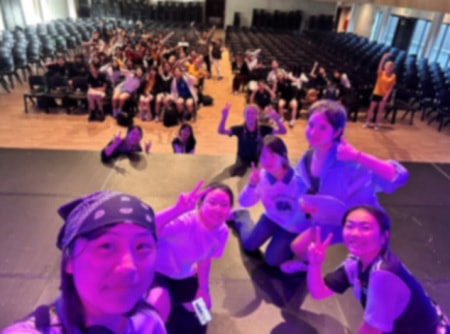
私は日本とニュージーランドの授業方法には少し違いがあると感じました。日本では先生が授業の内容を説明し、生徒がそれを理解する形が一般的ですが、私の英語や歴史の授業では、生徒が自分でタスクをこなし、先生がずっと授業をすることはほとんどありません。 そのため、先生が何かを説明し生徒に質問する際にはみんなが積極的に発言しています。初めは発言することや質問されることに抵抗を感じていましたが、今では恐れることなく発言できるようになりました。 また、ペーパーレスが進んでいると感じました。私の学校では、ダンスの授業以外では必ずラップトップが必要で、問題集は一冊しか配布されず、ほとんどの科目でクラスルームに投稿されたものに書き込み、提出するという方式です。 I have noticed some differences between Japanese and New Zealand teaching styles. In Japan, teachers usually explain everything, and students simply listen and learn. However, in my English and History classes here, students work on tasks independently, and teachers rarely lecture the whole time. Because of this, when teachers ask questions, students actively participate and share their thoughts. At first, I felt shy about speaking up, but now, I can express my opinions confidently without hesitation. I also noticed that schools in New Zealand are more paperless. In my school, except for Dance classes, students must bring a laptop for all classes. Each student only receives one workbook, and for most subjects, we write and submit assignments online using Google Classroom.
1ヶ月の学校生活を過ごして一番楽しかったことはAthletic Dayです。
入学時に5色のグループに分けられたグループ毎にイベントで競うため、グループごとの集会で事前に応援歌の練習などをしました。
日本の体育祭のようなかしこまった感じではなく、参加したい種目に自由に参加し、景品としてお菓子がもらえる形でした。日本では準備体操としてラジオ体操をすることが多いですが、私の学校では前に立っているダンスの先生や生徒をお手本にして踊る形でした。友達や先生とふざけながら踊ったので、朝からとても楽しい気分になりました。先生たちも、5色のグループに分けられた色の洋服を着て、一緒に盛り上げようとしているのが伝わりました。
Athletic Dayの後には、留学生だけのCulture Eventがありました。私は中国と日本の友達と一緒にK-POPダンスを披露しました。パフォーマンス中には歓声を上げてくれる子もいて、とても嬉しかったです。そのほかにもカラオケやミニゲーム、お菓子を食べるなど、楽しい時間を過ごしました。特にカラオケでは、英語、ドイツ語、中国語、日本語の曲が流れ、英語の曲ではみんなでマイクを回して歌い、ドイツ語や中国語、日本語の曲ではその国の人たちがステージで踊りながら歌いました。Athletic Dayの疲れが吹き飛ぶほど、楽しい思い出となり忘れられない日になりました。
〔ニュージーランドでの生活について:About daily life〕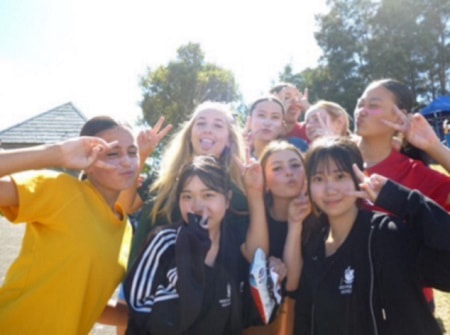 One of the most fun experiences I had in my first month of school was Athletics Day.
When we enroll, we are divided into five color groups, and we compete in events as a team. Before the event, we practiced our cheer songs in team meetings. Unlike Japanese sports festivals, Athletics Day is more casual and flexible. We can freely choose which events to participate in, and we even receive candy as prizes.
In Japan, warm-up exercises usually involve radio calisthenics, but in my school, we followed dance teachers and students as they demonstrated warm-up dances. Since my friends and teachers were dancing and having fun together, I started the morning feeling very happy. The teachers also wore clothes in their team colors and tried their best to hype up the event.
After Athletics Day, there was a Culture Event for international students. I performed a K-pop dance with my friends from China and Japan. During our performance, some students cheered loudly, which made us really happy.
There was also karaoke, mini-games, and eating snacks, and I had a great time. During karaoke, we sang songs in English, German, Chinese, and Japanese. For English songs, we passed the microphone around, and for the other languages, the students from those countries sang and danced on stage.
This event was so much fun that it made me forget about my tiredness from Athletics Day. It became an unforgettable memory.
One of the most fun experiences I had in my first month of school was Athletics Day.
When we enroll, we are divided into five color groups, and we compete in events as a team. Before the event, we practiced our cheer songs in team meetings. Unlike Japanese sports festivals, Athletics Day is more casual and flexible. We can freely choose which events to participate in, and we even receive candy as prizes.
In Japan, warm-up exercises usually involve radio calisthenics, but in my school, we followed dance teachers and students as they demonstrated warm-up dances. Since my friends and teachers were dancing and having fun together, I started the morning feeling very happy. The teachers also wore clothes in their team colors and tried their best to hype up the event.
After Athletics Day, there was a Culture Event for international students. I performed a K-pop dance with my friends from China and Japan. During our performance, some students cheered loudly, which made us really happy.
There was also karaoke, mini-games, and eating snacks, and I had a great time. During karaoke, we sang songs in English, German, Chinese, and Japanese. For English songs, we passed the microphone around, and for the other languages, the students from those countries sang and danced on stage.
This event was so much fun that it made me forget about my tiredness from Athletics Day. It became an unforgettable memory.
私は、南アフリカ出身のホストファザー、ドイツ出身のホストマザー、そして2匹の猫と一緒に暮らしています。ニュージーランドは多国籍国家だと聞いていましたが、私のホストファミリーはまさにそうだと思います。 ホストファミリーとの会話では、ニュージーランドのことだけでなく、ドイツや南アフリカについても教えてもらえるため、日々多くの新しい知識を得られるのでとても刺激的です。 ホストファザーは料理が好きで、一緒に日本マーケットへ行ったり、お好み焼きを作ったりしました。ホストファミリーは「おいしい」と言って、きれいに完食してくれたので、とても嬉しかったです。その後はホストファザー自身が日本食に興味を持ってくれ、肉じゃがや牛丼なども作ってくれるようになりました。今では、週に3回ほど日本食を食べています。 さらに、日本食をただ作り食べるだけでなく、「いただきます」、「ごちそうさまでした」も一緒に言うようになりました。お互いの文化を共有しながら生活することは、とても楽しいです。 I live with my host father, who is from South Africa, my host mother, who is from Germany, and two cats. I heard that New Zealand is a multicultural country, and my host family is a perfect example of that. Through conversations with my host family, I have learned not only about New Zealand but also about Germany and South Africa. Every day is exciting because I gain new knowledge. My host father loves cooking, so we went to a Japanese market together and made okonomiyaki. My host family said it was “delicious” and ate everything, which made me very happy. After that, my host father became interested in Japanese food and started cooking nikujaga and gyudon as well. Now, we eat Japanese food about three times a week. Also, we don’t just cook and eat Japanese food, we also say "Itadakimasu" and "Gochisousama deshita" together. Sharing each other’s cultures makes my daily life so enjoyable.
ホストマザーはアウトドアが好きなので、一緒にビーチへ行ったり、オークランド博物館を訪れたりしました。 特に Tawharanui Regional Parkに行った際には、海の水がとても綺麗で、海に入っても自分の肌がはっきり見えるほど透き通っていたのが印象的でした。この公園では、キウイをはじめとするニュージーランド固有の鳥たちを保護するため、ペットの立ち入りが禁止されていたり、駐車場へ向かう道では減速が求められたりするなど環境保護について沢山学ぶことができました。 都会でありながら自然を身近に感じられるニュージーランドの魅力を再実感しました。 その理由は、環境問題に対する意識が日本よりも高いことにあると思います。 オークランド市では、2040年までにゴミの排出量をゼロにする「ゼロ・ウェイスト」という取り組みを進めています。 ホストファミリーや先生によると、基本的にプラスチックゴミを出さないようにするのが当たり前だそうです。私のホームステイ先では、学校の morning tea(軽食の時間)やランチの際にプラスチック製のフォークやお菓子の袋を使うことがありますが、基本的には捨てずに洗って繰り返し使用します。他にも、常に水筒を持参したり、飲み物はプラスチック製のペットボトルではなく缶製のものを使用したりしています。 日本ではスーパーや100円ショップでレジ袋を購入するとビニール袋が渡されますが、ニュージーランドではビニール袋ではなく、ペーパーバッグのみが販売されています。そのため、ほとんどの人がエコバッグを持参しています。こうした取り組みが、都会のオークランドでも豊かな自然を感じられる背景になっているのだと思います。 My host mother loves the outdoors, so we went to the beach and visited the Auckland Museum together. When we went to Tawharanui Regional Park, I was amazed by how clear the ocean water was. I could even see my skin underwater. At the park, I learned a lot about environmental protection. For example, pets aren’t allowed to enter to protect New Zealand’s native birds, such as kiwis, and cars must slow down near the parking area. I once again realized the beauty of New Zealand, where nature is always close, even in the city. I think this is because people in New Zealand are more aware of environmental issues than in Japan. In Auckland, the city is doing the "Zero Waste" project to reduce waste to zero by 2040. According to my host family and teachers, it’s normal to avoid using plastic as much as possible. At my homestay, we sometimes use plastic forks or snack bags during morning tea or lunch, but we don’t throw them away, we wash and reuse them. We also always carry reusable bottles and prefer canned drinks over plastic bottles. In Japan, when we buy a bag at the supermarket or 100-yen shop, we usually get a plastic bag. However, in New Zealand, only paper bags are available, so most people bring their own eco-bags. I think these small efforts help maintain Auckland’s beautiful nature, even though it is a big city.
また、ニュージーランドの人々はとてもフレンドリーで、街を歩いているとすれ違う人が笑顔で挨拶をしてくれることがよくあります。
特に印象的だったのは、コンビニに行った際に店員さんが「どこの国から来たの?」と話しかけてくれたことです。日本から来たと伝えると、「こんにちは」や「ありがとう」と日本語で挨拶してくれました。日本語で声をかけてもらえるとは思っていなかったので、とても嬉しかったです。
今回だけでなく、店に行く際にはいつも店員さんが明るく“Hello.”や“Have a nice day!” “I like your clothes!!”などと声をかけてくれるので、こっちまで明るい気持ちになります。 このようにたくさんの魅力があるニュージーランドで生活できることをとても幸せに感じています。
この環境を与えてくれた日本の家族、先生方、そしてホストファミリーへの感謝を忘れず、残りの1か月も悔いのないように、何事にも恐れず積極的に行動していきたいです。
Another thing I love about New Zealand is how friendly people are. When I walk down the street, people smile and say hello. One of my most memorable experiences was when a convenience store clerk asked me, "Where are you from?" When I said I was from Japan, he greeted me in Japanese, saying, "Konnichiwa" and "Arigato."
I didn’t expect that, so it made me very happy.
Not just that, but whenever I go shopping, store clerks always greet me cheerfully, saying things like, "Hello!", "Have a nice day!", or even "I like your clothes!” Their kindness makes me feel happy, too.
I feel so lucky to be living in such a wonderful place. I’m appreciative of my family in Japan, my teachers, and my host family for giving me this opportunity. I’ll make the most of my last month here, facing new challenges without fear.
